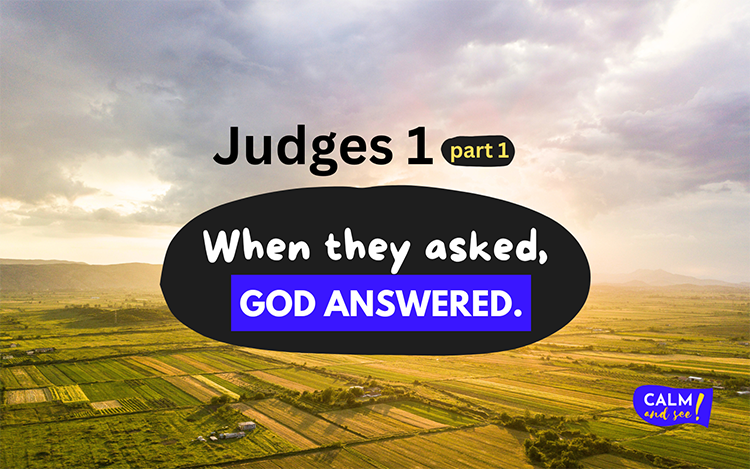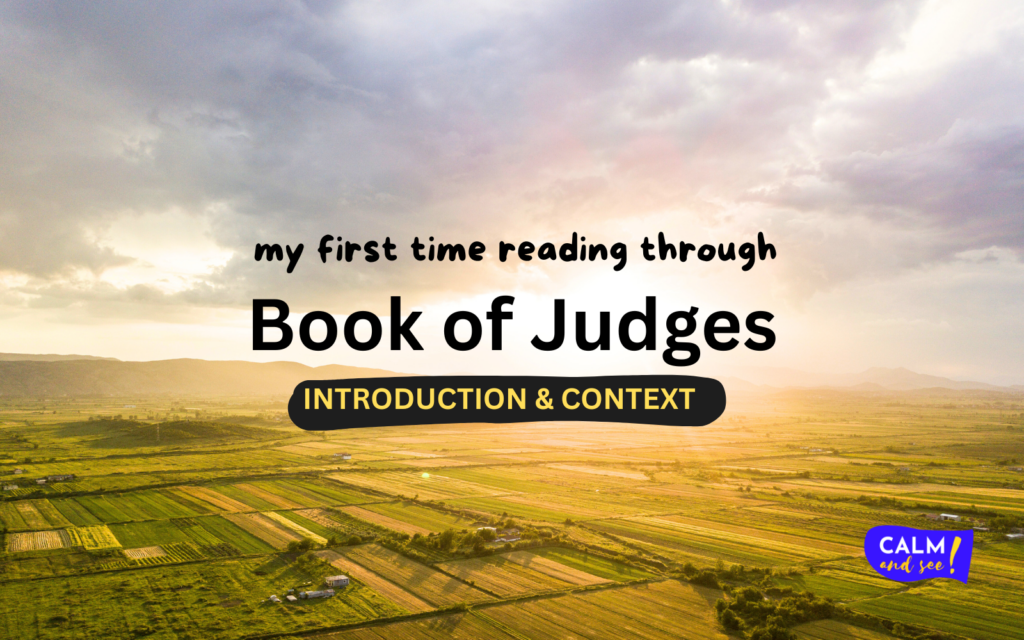
Come! Now that we have some background and context to Judges, let’s read Chapter 1 together slowly. This isn’t a bible study, I am not a teacher nor in clergy — simply sharing the research, reflections and observations in my personal reading. This is my first time reading through the Book of Judges from beginning to end – so take care to do your own research. I encourage you to read it on your own too, and see how and what God reveals to you.
¹After the death of Joshua, the people of Israel inquired of the LORD, “Who shall go up first for us against the Canaanites, to fight against them?” ²The LORD said, “Judah shall go up, behold, I have given the land into his hand.”
Judges 1:1-2
Time Period of the Book of Judges
Scripture explains scripture. The opening verses of Judges tell us when this book begins — after the death of Joshua. This means the events take place in a time when much of the Promised Land had already been conquered, but the conquest wasn’t yet complete. There was also no central leader appointed over the 12 tribes of Israel as unlike Moses, God did not appoint a successor for Joshua.
People of Israel
The people of Israel are the descendants of Jacob whom God renamed Israel (Genesis 32:28). Jacob had 12 sons, and over generations, their families grew into a nation – the Israelites.
The Tribes of Israel
The 12 tribes are named after Jacob’s sons:
1. Reuben
2. Simeon
3. Levi
4. Judah
5. Issachar
6. Zebulun
7. Dan
8. Naphtali
9. Gad
10. Asher
11. Ephraim (Joseph’s younger son)
12. Manasseh (Joseph’s elder son)
13. Benjamin
Yes – that’s 13 names, but we will see later scripture calls them 12 tribes.
Jacob had 12 sons – where are there 13 names?
Before Jacob died, he gave his son, Joseph, a double portion of the inheritance by adopting Joseph’s two sons, Ephraim and Manasseh, as his own (Genesis 48). Hence, this gave Ephraim and Manasseh their own share of inheritance, just like the other sons of Jacob. So instead of the “tribe of Joseph”, the Bible lists Ephraim and Manasseh as individual tribes.
Why 13 Sons but only 12 Tribes?
That’s where the Levites come in. The Levites are descendants of Levi, Jacob’s third son. In Numbers 1:47–50, God instructs Moses not to count the tribe of Levi in the population census. Why? Because God had set the Levites apart for priestly service and the care of the tabernacle.
As a result:
- The Levites did not receive a land allotment in the Promised Land
- They did not engage in military battles
- Instead, they lived in designated cities among the other 12 tribes.
So while the Levites are a tribe by lineage, they are not included in the count of tribes receiving land or fighting battles.
Who Are The Canaanites?
The Canaanites were the original inhabitants of the land of Canaan — the land God promised to Abraham, Isaac, and Jacob. They were not Israelites and were considered foreigners to the Israelites.
Why did God want to give the Canaan to the Israelites?
- To fulfil His promise to Abraham, Isaac and Jacob (Genesis 17 and beyond)
- To judge the wickedness of the Canaanite nations – not because of the Israelites’ righteousness
In Deuteronomy 9:4-5, God told the Israelites via Moses:
“⁴Do not say in your heart, after the Lord your God has thrust them out before you, ‘It is because of my righteousness that the Lord has brought me in to possess this land,’ whereas it is because of the wickedness of these nations that the Lord is driving them out before you.
⁵Not because of your righteousness or the uprightness of your heart are you going in to possess their land, but because of the wickedness of these nations the Lord your God is driving them out from before you, and that he may confirm the word that the Lord swore to your fathers, to Abraham, to Isaac, and to Jacob.” – Deuteronomy 9:4-5 - To set Israel apart from the other nations – as a Holy nation (Leviticus 20:24)
“24 But I have said to you, ‘You shall inherit their land, and I will give it to you to possess, a land flowing with milk and honey.’ I am the Lord your God, who has separated you from the peoples.”
– Leviticus 20:24 - To demonstrate God’s power and faithfulness, even when His people were unfaithful
My Observations on Judges 1:1-2
Now that Joshua has passed, and Israel no longer has a central leader. Instead of acting on their own, they sought and asked God for His guidance on who should lead the next conquest.
And God responded:
- with clarity: “Judah shall go up”
- with assurance: “behold, I have given the land into his hand.”
As we continue to read the bible, let’s pay attention to the times when people reached out to God, and look out for when and how God responds. In this case, the Lord responded with clarity and assurance.
Personal Application on Judges 1:1-2
I am encouraged to seek and ask God in prayer for everything. From what I have read so far in the Bible, God always responds when we ask, and He desires for us to seek Him first and ask Him. I am encouraged that the Israelites, came together united, to seek the Lord for guidance instead of acting on their own.
That’s all for today. This is quite a lot for 2 verses – But hopefully this will provide some foundation as we continue reading the Book of Judges!



